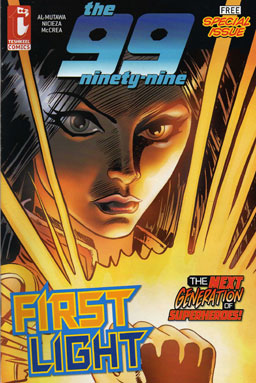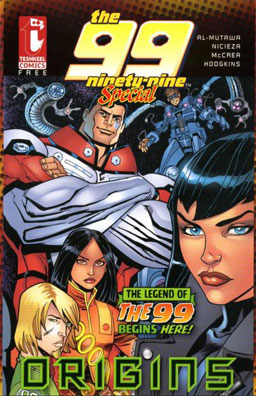The 99
The 99
I actually received these comics in the mail last week from Naif Al-Mutawa, who is the creator of “The 99,” one of its writers, and the guy in charge of Teshkeel Media Group, after blogging about this new series earlier this month.
The series is written by al-Mutawa and Fabian Nicieza, with pencils by John McCrea and inks by James Hodgkins and Sean Parsons. If you’ve read comics for a while, you should at least recognize Nicieza and McCrea, who’ve been working in comics at both Marvel and DC for ages. Two of the three issues I got were free introductory comics, designed to get new readers on board with the characters and the concept.
“The 99” is the first effort at creating a truly multicultural comic since Milestone Media’s comics back in the mid-1990s. Teshkeel has previously published some Marvel Comics titles in Arabic, and has entered agreements with DC Comics and Archie Comics to publish Arabic-language comics throughout the Middle East and North Africa. Al-Mutawa came up with the idea of creating an Islamic-themed comics series while trying to think of a way to help Muslim kids bridge the gap between the East and the West, while giving Muslim children some more positive Muslim role models than they usually see in Western media. And yeah, I think part of the goal of the comics is certainly outreach and education to Western comics readers. The basic concept: a team of international superheroes who take their names and their powers from the 99 names of Allah.
There’s really a lot of backstory to deal with here. The story starts clear back in the 13th century, when the Mongols sacked Baghdad, killed most of its inhabitants and destroyed most of the city. In the comic’s timeline, the city’s librarians alchemically infused 99 gemstones with the accumulated knowledge of the Muslim world’s scholars. The Noor Stones were scattered throughout the world, waiting for the right people to find them and unlock their potential.
From there, we jump to the modern world, where we follow Dr. Ramzi, philanthropist and head of the 99 Steps Foundation, who has spent his life searching for the Noor Stones. He believes that the gems can empower certain people and help him ensure his own goals of world peace. Soon, he meets up with a Saudi teenager whose contact with a Noor Stone has caused him to manifest colossal superstrength — he becomes known as Jabbar, the Powerful.
Later, he makes contact with a girl from the United Arab Emirates who can control light and is able to see everything from the combinations of locks to the nature of human souls — she gets designated Noora, the Light — and a paraplegic American who is able to bring both suffering and healing with a touch — he is called Daar, the Afflicter. There are tons more on the way, of course — Ramzi and the rest of his team have another 96 Noor Stones to find.
I gotta say, I’m enjoying what I’m seeing so far. As I’ve said before, I get tired of reading comics where all the characters are white Americans, and I love the idea of getting a glimpse into Islam and the Muslim world that isn’t filtered through the stereotypes and misinformation pushed at us on the news channels. And I love the way they’re setting up a global team of heroes that actually includes characters from many different nations and cultures.
Though the series is inspired by Islamic concepts, it isn’t really an all-Muslim comic — in fact, at this point, we don’t know what religion, if any, that the characters subscribe to. Sure, Jabbar, Noora, and Dr. Ramzi come from traditionally Muslim countries, but Daar, the American, is a blond-haired Caucasian. I’m sure religion will eventually move to the forefront of at least some of the stories, but at this point, this is a series that’s being driven by plotlines and characterizations, not by any hardline ideologies.
And because I haven’t mentioned them yet, the plots and characterizations are all rock-solid. Dialogue is good — granted, it doesn’t pop the way dialogue does by Brian Michael Bendis or Grant Morrison, but not everyone can be Bendis or Morrison. I can’t really say anything bad about the artwork — it’s not a style I’m really enthused about, but it’s clear, distinct, it gets the job done, and it’s not that much different than what you’d see in any mainstream superhero comic.
Verdict: Thumbs up. I’m hoping to get the folks at Star to put this on my pull list.
(By the way, I found some great resource pages for this, including this PBS interview with al-Mutawa and a collection of reviews, analysis, and commentary about the series.)



